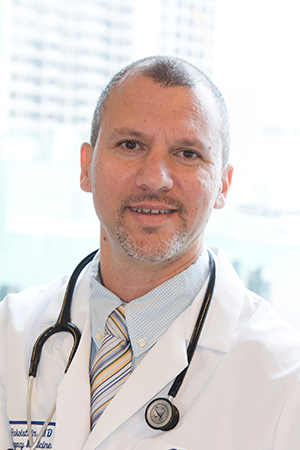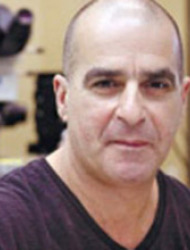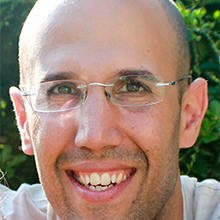Every year, more Canadian teenagers die by suicide than by all medical diseases combined, including cancer, diabetes, asthma and infections.
Dr. Yaron Finkelstein, a professor of pediatrics, pharmacology and toxicology at the University of Toronto and a staff physician at the Hospital for Sick Children (known as SickKids), shared this fact with the Jewish Independent in advance of Bridging Hope: Science and Testimonial in the Fight Against Addiction. Presented by Canadian Friends of the Hebrew University of Jerusalem, King David High School (KDHS) and Vancouver Talmud Torah (VTT), the Sept. 26 event at KDHS will also feature Dr. Yonatan Kupchik, senior lecturer, department of medical neurobiology, the Hebrew University of Jerusalem (HU), and Dr. Rami Yaka, head of the School of Pharmacy at HU, discussing the science of addiction. The testimonial part of the gathering will be shared by members of the Epstein-Bogdonov family. In this issue of the Independent, we talk to the doctors. Next issue, we will meet Elana Epstein and David Bogdonov, who, with their son, Noah Bogdonov, will speak in September about their family’s experience with addiction.
“Drug overdose, led by the opioids crisis, is an immense public health problem in BC, Canada and globally,” Finkelstein said. “Effectively addressing the loss of so many people for overdose daily, a largely preventable condition, must be a national priority. Indeed, youths are also highly affected, and we see them in the emergency departments, in clinics and, sadly, on the streets. Further, some youths use overdose as a common means of self-harm and suicide attempt.”
Finkelstein added that “most medications administered to children, particularly in hospitals (up to 85% in some acute care settings) have not been properly studied and approved in this population. Rather, we ‘borrow’ them from our experience in adults, scale the dose down to the child’s weight and hope to achieve the same effects and outcomes. However, we know this is not always the case, sometimes the outcomes are unwarranted, and I have personally noticed that repeatedly over the years. The goal of my research program is to work hard and close this knowledge gap – find the safest and most effective medications for children, and tailor their dosing regimens to the pediatric needs.”

At Bridging Hope, Finkelstein will discuss “the impacts of cannabis legalization on pediatric poisonings – trends and severity (for example, many do not appreciate that edible cannabis products can kill a child) – and on mental health, including addiction and the risk of developing schizophrenia in youths and adults.”
Canada became the second country to legalize cannabis for recreational use in 2018, he said. “This ‘natural experiment’ has led to numerous unanticipated outcomes, many have negative impacts on public health, and particularly on children.”
Finkelstein’s main research is centred on pediatric therapeutics in acute-care settings, with the long-term goal of optimizing drug safety.
“During my clinical clerkship in medical school, my passion to help children grew tremendously, and I was inspired by my mentors,” he shared. “Children have immense resilience, and their recovery is often fast and remarkable, and provides hope. I was always fascinated by the mechanistic actions of drugs on the human body, and combining those passions felt natural.”
“From the early beginning of my studies, I was thrilled to understand how the brain functions,” said Yaka, who not just heads HU’s School of Pharmacy but conducts research as well. “The brain reward circuitry is the most important system in any living creature, since it is responsible for our survival and reproduction, therefore, our existence. My main research is focused on synaptic function in health and disease.”

Yaka joined the School of Pharmacy in 2003 and has served in many capacities. “Since I feel that the School of Pharmacy is like my second home and I really care about its future, and since I have all the necessary experience to take this mission, I volunteered to head the school,” he said. “Maintaining the right balance between the administrative duties and the research (my main cause of being here) is challenging. I work harder and try to pay the same attention to both tasks without reducing any effort for either.”
On Sept. 26, Yaka will talk about “‘out of the box’ research to battle drug addiction.”
“Since addiction to drugs, screens, food, etc., is very common and spreads all over the world very easily, this subject is very popular among laypeople,” he said. “Therefore, for me, it’s easy to adopt lay language to explain in simple words what the problem is and what we can do to avoid having it. I think that a huge part of the problem is the lack of knowledge among users (mainly young) about the adverse effects and negative impact that drugs have on the brain.”
With respect to educating youth and engaging them more broadly in science, Kupchik sees his role as a principal investigator at a leading university as “not only to generate new knowledge that may lead the world forward but also to plant the seeds for the next generation of principal investigators.”
“In Israel,” said Kupchik, “there are several programs that select the top high school students in the country and expose them to academia at their early age. This is excellent, but … there are many excellent students that we may be missing as a society just because they live in underprivileged places. Therefore, we try in the lab to specifically target those populations of students, and we do it in various ways. For example … [we] started an initiative that invites local high school students to scientific conferences taking place in their vicinity. For many students, this is the first interaction with science and many of them reported later that it induced interest in the scientific world. We also invite high school students to our laboratory and provide an interactive experience in which they learn about the brain and how scientific research is performed.”

What most intrigues Kupchik about neurobiology “is how a biological organ, composed of billions of neurons that communicate with each other, generates such complex phenomena as behaviour, emotion, thoughts, etc.” His lab at HU researches the changes occurring in single neurons or in brain circuits in drug addiction or obesity. Among other things, they are currently collaborating with two neighbouring labs.
“One is with the laboratory of Dr. Shai Sabbah, an expert in the neurobiology of light processing in the eye. It is known that exposure to light can affect mood and the neural activity in brain areas related to emotions. We are investigating in this collaboration whether light exposure could also affect drug-seeking behaviour.
“Another collaboration is with the laboratory of Dr. Danny Ben-Zvi, an endocrinologist and expert of the bariatric surgery. As bariatric surgery decreases the craving for rewarding foods, we are now investigating together whether the bariatric surgery drives permanent changes in the reward system of the brain and whether it could affect the craving for other, non-food, rewards.”
Kupchik said, “We believe that there are many similarities between behaviours that may reflect addiction, such as drug dependence, overeating, gambling, hoarding, computer gaming, social media use and so on, and hope that understanding the neurobiological mechanisms in one kind of addiction could hint about the mechanisms of other addictions. We chose to focus on drug addiction and on obesity both because these are two main global health challenges that remain unsolved and because these are conditions that can be modeled in laboratory animals.”
At King David High School, Kupchik “will try to show some of the permanent changes we found that occur in the reward system after using cocaine, and after withdrawal.”
For tickets ($18) to Bridging Hope, visit register.cfhu.org/bridginghope.
